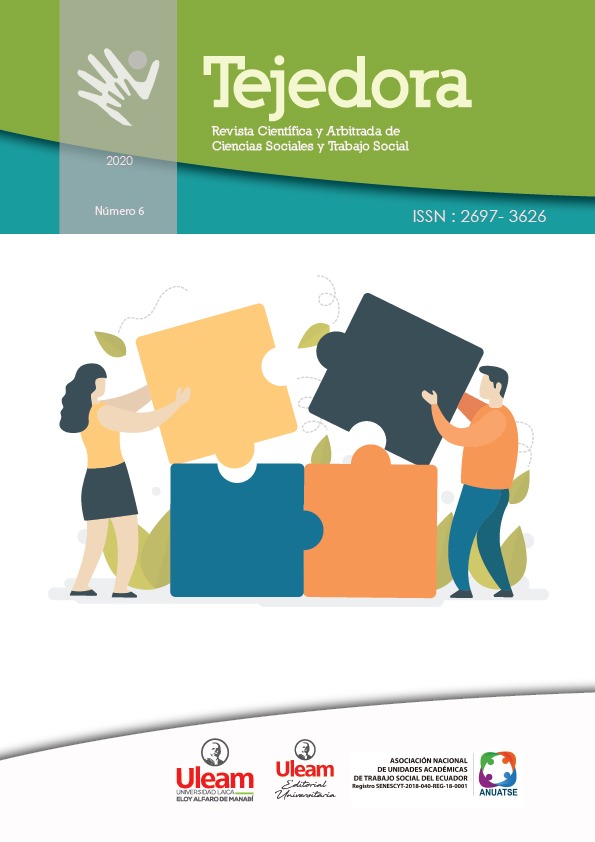COMPREHENSION OF NON-LITERARY TEXTS IN BASIC GENERAL EDUCATION STUDENTS
DOI:
https://doi.org/10.56124/tj.v7i13ep.002Keywords:
reading comprehension, non-literary text, Language and literature, basic education, macro dexterityAbstract
This research addresses the problem of reading comprehension at the school level. To this end, an intentional sample of 68 students in the eighth year of basic education of the "Roberto Alfredo Arregui" Educational Unit in the city of Guaranda, Bolívar province, Ecuador, was previously asked to read short narrative texts. Once a multiple-choice test was validated through a pilot test, this instrument was applied. Likewise, a structured interview was conducted with a Language and Literature teacher, with the intention of having contrasting elements against the data reported by the student test. The results of this study reveal that most students' reading is limited to primary decoding. That is, it focuses attention on the search for the meaning of those words that are unknown and that are contained in the sentences that make up the paragraphs of the non-literary text. Hence, by putting this type of mechanism into action, according to the students, it is more than enough to find the thought of the author(s).
.
KEY WORDS: reading comprehension; non-literary text; Language and literature; basic education; macro dexterity.
Downloads
References
Arellano, J. y Barredo, D. (2017). Las nuevas prácticas de lectura en los jóvenes universitarios ecuatorianos. Un estudio de caso sobre la Universidad Estatal de Bolívar (2017). Enlace Universitario, (1), 48-55. https://enlace.ueb.edu.ec/index.php/enlaceuniversitario/article/view/21
Caín, K. (2022) Dificultades de la comprensión lectora de los niños. DOI: https://doi.org/10.1002/9781119705116.ch14
Duke, NK y Cartwright, KB (2021). La ciencia de la lectura progresa: comunicar avances más allá de la simple visión de la lectura. Lea la Res. Q, 56 (S1), S25 – S44. https://doi.org/10.1002/rrq.411
Flotts, et al. (2016). Aportes para la enseñanza de la lectura. UNESCO. https://unesdoc.unesco.org/ark:/48223/pf0000244874
INEVAL (2018). Educación en Ecuador: Resultados de PISA para el desarrollo. https://www.evaluacion.gob.ec/wpcontent/uploads/downloads/2018/12/CIE_InformeGeneralPISA18_20181123.pdf
Kate Nation (2019) Dificultades de lectura, lenguaje y reflexiones de los niños sobre la visión simple de la lectura, Australian Journal of Learning Difficulties, 24:1, 47-73, DOI:10.1080/19404158.2019.1609272
Mansurov VA, Lombina TN, Yurchenko OV Problemas de comprensión del texto por parte de los escolares: una visión sociológica Vestnik instituta sotziologii. 2022. vol. 13.No. 3. Pág. 122-141 DOI: https://doi.org/10.19181/vis.2022.13.3.835 . EDN: JVDGMK
Ministerio de Educación del Ecuador (2016). Guía didáctica de implementación curricular para EGB y bachillerato. Lengua y literatura. https://educacion.gob.ec/wp-content/uploads/downloads/2017/05/Guia_15_mayo_Literatura_Elemental_EGB_BGU.pdf
Muñoz Calvo, E. M., Muñoz Muñoz, L. M., García González, M. C., & Granado
Labrada, L. A. (2013). La comprensión lectora de textos científicos en el proceso de enseñanza- aprendizaje. Humanidades Médicas, 13(3), 772-804.
Lengua y Literatura. (2020) Blog. De nómadas a sedentarios: un salto cultural fundamental. https://lenguayculturadesafios.blogspot.com/2020/11/de-nomadas-sedentarios-un-salto.html
Pérez, S. (2015). Estrategias cognitivas y metacognitivas para la comprensión lectora. [Tesis de maestría, Universidad Distrital Francisco José de Caldas]. https://repository.udistrital.edu.co/bitstream/handle/11349/3951/P%E9rezHern%E1ndezSusana2015.pdf;jsessionid=A9A8A502B84653C931EAFEF00E84E9D3?sequence=1
Sepúlveda, S. F., & Martínez, M. Á. T. (2018). La importancia de la comprensión lectora: un análisis en alumnado de educación básica en Chile. Revista de Educación de la Universidad de Granada, 25, 113-129.
William E. Tunmer y Wesley A. Hoover (2019) Los fundamentos cognitivos del aprendizaje de la lectura: un marco para prevenir y remediar las dificultades de lectura, Australian Journal of Learning Difficulties, 24:1, 75-93, DOI:10.1080/19404158.2019.1614081
Vidal, D. y Manríquez, L. (2016). El docente como mediador de la comprensión lectora en universitarios. Revista de la Educación Superior, XLV (1), 95-118. http://www.scielo.org.mx/scielo.php?pid=S0185-27602016000100095&script=sci_abstract
Yana et al. (2019). Estrategias cognitivas y la comprensión lectora en los estudiantes de nivel básica y superior. Revista Innova Educación, 1(2), 211-217. https://doi.org/10.35622/j.rie.2019.02.007
Published
How to Cite
Issue
Section
License
Copyright (c) 2024 Revista Científica y Arbitrada de Ciencias Sociales y Trabajo Social: Tejedora. ISSN: 2697-3626

This work is licensed under a Creative Commons Attribution-NonCommercial-ShareAlike 4.0 International License.






















